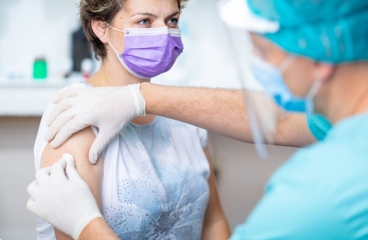COVID-19 Vaccine: Care Instructions
Overview

The COVID-19 vaccine can help protect you from getting very sick from COVID-19. If you get COVID-19, your
symptoms will probably be less severe than if you hadn't gotten the vaccine. You can't get COVID-19 from the
vaccine.
The number of doses you need can depend on your age, your health, which vaccine you get, and whether updated
vaccines are recommended. Your doctor or pharmacist can tell you how to stay up to date.
What are the side effects of the COVID-19 vaccine?
You might not have side effects. But if you do, they'll probably be like those of other vaccines, including:
-
Fever.
-
Soreness.
-
Feeling very tired.
This is normal. Your body is building protection against COVID-19.
You may also have other side effects, including:
-
Chills.
-
Headache.
-
Pain, redness, a rash, or swelling in the arm where you had the vaccine.
-
Swollen lymph nodes in the armpit of the arm where you had the vaccine.
-
Nausea.
Side effects will likely go away in a few days. Until then, it may be harder to do your usual activities.
If you think you've been exposed to COVID-19 or have symptoms like a cough, trouble breathing, or a new loss
of smell or taste, call your doctor. These aren't vaccine side effects. You need a COVID-19 test.
Follow-up care is a key part of your treatment and safety. Be sure to make and go to all
appointments, and call your doctor if you are having problems. It's also a good idea to know your test results
and keep a list of the medicines you take.
How can you care for yourself at home?
-
If you have a sore arm or a fever after getting the COVID-19 vaccine, you can take an over-the-counter
pain medicine, such as acetaminophen (Tylenol) or ibuprofen (Advil, Motrin). Read and follow all
instructions on the label. Do not give aspirin to anyone younger than 20. It has been linked to Reye
syndrome, a serious illness.
-
Put ice or a cold pack on the sore area for 10 to 20 minutes at a time. Put a thin cloth between the ice
and your skin.
-
If you have side effects, such as a fever, be sure to get enough rest and drink plenty of fluids.
When should you call for help?
 Call 911
anytime you think you may need emergency care. For example, call if after getting the COVID-19
vaccine:
Call 911
anytime you think you may need emergency care. For example, call if after getting the COVID-19
vaccine:
Call your doctor now or seek immediate medical care if:
Watch closely for changes in your health, and be sure to contact your doctor if you have
any problems.
Current as of: February 28, 2024
Content Version: 14.0
Care instructions adapted under license by your
healthcare professional. If you have questions about a medical condition or this instruction, always ask
your healthcare professional. Healthwise, Incorporated disclaims any warranty or liability for your use of
this information.